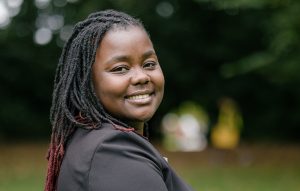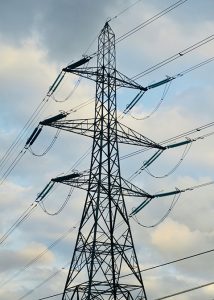By Wayne Gillam / UW ECE News

UW ECE Assistant Professor June Lukuyu has established the Interdisciplinary Energy Analytics for Society, or IDEAS, research group at the UW. IDEAS focuses on planning and developing sustainable, inclusive, and integrated energy systems and technologies for underserved communities around the world. Photo by Ryan Hoover / UW ECE
UW ECE Assistant Professor June Lukuyu was born and raised in a small community outside of Nairobi, Kenya, where both of her parents worked as agricultural research scientists. In school, she excelled in math and physics, and she knew early on that she wanted to pursue a career in engineering. She also was familiar with the frequent power outages and other electrical grid problems that are common throughout East Africa. Lukuyu realized at a young age that she wanted to do something with engineering that could address large-scale problems such as this, but at the time, she wasn’t sure how to turn that idea into a reality.
While in high school, she applied as an international student to colleges and universities in the United States and was accepted into Smith College in Northampton, Massachusetts, on a full-ride scholarship. It was there, while pursuing her bachelor’s degree in engineering science, she was introduced to the concept of merging disciplines.
“Energy systems were, for me, at the core of how society worked. It intertwined with so many different things. So, I knew I wanted to do something technical with engineering, something to do with power systems,” Lukuyu said. “But what was really surprising for me was how being in a liberal arts school shaped how I perceived energy systems because my coursework was not just from a technical perspective.”
At Smith College, Lukuyu was encouraged to take courses in economics, psychology, and other social sciences, alongside her engineering studies. This blending of disciplines got her thinking about how energy systems relate to the social and cultural contexts in which they reside. After graduating from Smith College in 2013, she worked for a time at a software company doing cost estimation for power systems. She then studied renewable energy systems technologies through a distance-learning program at Loughborough University, where, in 2016, she received her master’s degree. In 2022, she earned a doctoral degree from the University of Massachusetts Amherst, where her research was aimed at finding ways to create a more integrative approach to solving energy problems in underserved communities.
“We’re flipping the narrative, where instead of just bringing in a decentralized power system, undersizing or oversizing it, and then trying to get people to use it, we first attempt to understand the community and then build systems that are responsive to their needs.”
— UW ECE Assistant Professor June Lukuyu
In January 2023, Lukuyu accepted a position at UW ECE as an assistant professor. She said that she had been looking for an environment that would value intellectual freedom as well as appreciate and support the interdisciplinary nature of her research. She also was interested in continuing field work she started while pursuing her doctoral degree that was mostly located in East African communities.
“There is a really good group of people at the UW, even outside of ECE, who do international work. There’s a global health school, a team in the Allen School that creates technologies for developing countries, and a public policy school that works in Africa,” Lukuyu said. “So, there’s several different groups here that I can collaborate with. I also wanted to develop courses that would be cross-cutting and multidisciplinary within the Department. The support for all of this was here, and by the time I finished interviewing at UW ECE, I knew that if I received an offer, it was a place I really wanted to be.”
Lukuyu brings a strong technical background to the Department and has received recognition early in her academic career for the strength of her research work. Her awards and honors include a Grace Hopper Celebration Scholarship, a Microsoft Research PhD Fellowship (Finalist), a Link Foundation Energy Fellowship (Honorable Mention), and a Spaulding Smith Fellowship at the University of Massachusetts Amherst.
“Most people approach issues with electrical grids and sustainable energy from either a pure science and engineering perspective, an industrial point of view, or a community-based social science standpoint,” said UW ECE Professor and Chair Eric Klavins. “June blends all these approaches in an innovative way to find integrated, holistic, and long-lasting solutions. We are very impressed with her expertise and delighted to have her as a part of our Department.”
IDEAS for sustainable, inclusive and integrated energy systems
Lukuyu has established the Interdisciplinary Energy Analytics for Society, or IDEAS, research group at the UW. IDEAS focuses on planning and developing sustainable, inclusive, and integrated energy systems and technologies for underserved communities. The core of Lukuyu’s work with IDEAS is blending technological innovation and social development, pushing beyond the boundaries of conventional engineering practices, and emphasizing a mixed-methods approach. This work is interdisciplinary, incorporating students and faculty from several different units and departments across multiple universities, and transdisciplinary, including partnerships with startup companies, utilities, and the communities in which they serve. The IDEAS research group includes three UW ECE doctoral students, Eliane Nirere, Ahana Mukherjee, and Kwame Donkor. The group will expand soon and welcome two more incoming doctoral students, Miquilina Anagbah and Aya Alayli.
IDEAS oversees collaborative projects in cities and communities around the world. The group has worked primarily in Africa, in countries such as Kenya, Uganda, Ghana, and Rwanda, but Lukuyu has also been involved in projects in the Fiji Islands and here in Washington state through Spark Northwest, a Seattle-based nonprofit organization that partners with communities to build an equitable, clean energy future. Because IDEAS is bringing engineers together with industry, government, and community organizations, the work is by nature highly collaborative. It is also aimed at creating long-term, customized solutions.
“We’re flipping the narrative, where instead of just bringing in a decentralized power system, undersizing or oversizing it, and then trying to get people to use it, we first attempt to understand the community and then build systems that are responsive to their needs,” Lukuyu said.
Partnerships and grants

In October 2023, Lukuyu received a Climate Change AI Innovation Grant. This grant program supports projects that address research and deployment challenges in climate change mitigation, adaptation, and climate science by leveraging AI and machine learning, while also creating publicly available datasets and tools to catalyze further work. Photo by Rose Galloway Green / Unsplash
At the UW, Lukuyu is affiliated with the Clean Energy Institute, the Evans School Policy Analysis & Research Group, and the Information and Communication Technology for Development Lab in the Paul G. Allen School of Computer Science & Engineering. Outside of the UW, she serves on the board of Spark Northwest, is a co-principal investigator with the Electricity Growth and Use in Developing Economies initiative, and is a fellow with the Energy for Growth Hub. She also collaborates with faculty in the Department. For example, she recently wrote a paper with UW ECE Professor and former Chair Radha Poovendran, describing the design of pricing mechanisms for microgrids. Their work will be presented at the 2024 Institute of Electrical and Electronics Engineers (IEEE) Power & Energy Society (PES) General Meeting, which will be held this month in Seattle, Washington.
Lukuyu has been the recipient of a growing number of grants during her time at UW ECE. She was awarded a Collaborative Seed Grant from the Clean Energy Institute, along with UW ECE Associate Professor Baosen Zhang, to study climate and equity considerations for community-based electricity demand response strategies in the Pacific Northwest. She also has received a grant from the UW’s Royalty Research Fund, which is supporting work Lukuyu is doing blending qualitative and quantitative methods for energy needs assessment.
In October 2023, Lukuyu received a Climate Change AI Innovation Grant. This grant is enabling Lukuyu and her research team to collaborate with the tech startup nLine, local government, and community partners in Accra, Ghana, to produce a low-cost, flexible sensor network that will monitor and strengthen the city’s electrical grid while helping to lower costs and associated greenhouse gas emissions.
“We are gathering data about power reliability and quality from granular voltage measurements across the city and pairing it with an AI or machine learning approach to be able to predict where the topology of the grid is and where the grid interconnections are,” Lukuyu said. “I think that having this data is power. It can reveal and highlight inequities in how an infrastructure is managed and help us get at those questions of how we could provide better quality power and infrastructure for the community.”
Educating the next generation
In her work as an educator at UW ECE, Lukuyu instructs a mix of undergraduate and graduate students. She teaches a course on wind energy development that last quarter included a field trip to the Wild Horse Wind and Solar Facility and Renewable Energy Center in Ellensburg, Washington. She has also designed a special topic course for graduate students focused on sustainable energy and global development. This course introduces the challenge of energy poverty in underserved communities around the world and explores the relationship between current and future energy needs and achieving sustainable energy systems.
“We are taking a global perspective on energy poverty, on how energy interplays with sustainable development goals, security, government policy, and rural development. The course contains many different pieces that rely heavily on students being willing to explore and engage,” Lukuyu said. “I’ve been amazed at the quality of students at UW ECE and their perspectives. It has really enriched the course.”
Lukuyu has found much enthusiasm for this special topic course, and it has proven to be popular both inside and outside the Department. Students from mechanical engineering, civil engineering, and even chemical engineering have taken the course.
As a relatively new instructor, Lukuyu said that she was pleasantly surprised how much she has enjoyed teaching at UW ECE, and she often learns new information and ways of looking at things from her students. Lukuyu enjoys novelty outside of the classroom as well, including traveling to places she has never been to before and meeting new people. She also holds a deep belief in the value of learning and passing on knowledge to the next generation.
“I think we often underestimate the power of education,” Lukuyu said. “The UW is an intensive research institution, but it is also shaping the minds of young people. Even in our role as researchers, we are educating and mentoring. We have a responsibility for the platform we have, and the things we enforce in the classroom are going to have repercussions. I think it’s important for all of us to remember that our students are going to be the future of engineering.”
For more information about UW ECE Assistant Professor June Lukuyu and her research work, visit her bio page or the IDEAS website.

